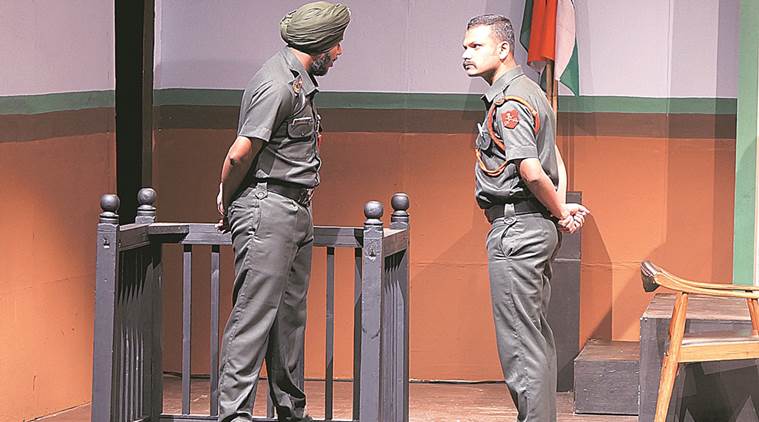‘If politicians did their job, art wouldn’t be talking about politics’
MG Jyotish on minority communities, childhood reading and his play, Court Martial.
 A scene from Court Martial.
A scene from Court Martial.
MG Jyotish shakes his head, rattles his memory and says, “I don’t think I ever talk to my mother, father or brothers about something ordinary or funny. It is always politics. I grew up hearing my family discuss day-to-day politics and argue like anything. From my childhood, that’s how it has been.” Some of the political discourse influenced Jyotish’s play, Court Martial. The sparse crowd that turned up for the play, a legal drama based on caste hierarchies in the Indian Army, at the Theatre Olympics in Delhi gave Jyotish a standing ovation.
The director accepted the honours dressed in dull clothes and sandals. At the Mahindra Excellence in Theatre Awards in 2012, when his play, Macbeth, was announced winner for Best Choreography, Best Costume Design and Best Lighting Design, Jyotish had come on stage wearing a jacket borrowed from a member of the audience. By the time, he was declared Best Director, over nine other heavyweights, Jyotish had ditched the look and turned up in rolled-up shirtsleeves. “I’m like this and I want to be myself,” he says.
Court Martial is one of the classics of the contemporary stage. As with Macbeth, where the protagonists, Macbeth, Lady Macbeth and Banquo are emblems of psychological states of consciousness, sub-consciousness and the super ego, respectively, Court Martial is filled with symbolism by Jyotish. The narrative revolves around a jawan from the Dalit community, Ram Chander, who is on trial for murdering a senior officer and injuring another. Jyotish, 42, is dedicating this play to 30-year-old Madhu, the tribal man who was beaten to death in Kerala in February this year. “They simply killed him. Just like that… We are dedicating this play to Madhu,” he says.
Jyotish’s parents and brothers were active CPM members and Jyotish was a part of the Student Federation of India in school. “We were used to fighting and putting up posters,” he says. The Communist culture also ensured that Jyotish was introduced to great works of literature and cinema early in his childhood. By the time he finished Class X, Jyotish had read the classics, from Maxim Gorky’s The Mother to Leo Tolstoy’s Anna Karenina, as well as Russian folk tales, whose detailed illustrations are finely etched in his mind. “I didn’t know anything about Aravindan (G.Aravindan was one of the pioneers of parallel cinema in Kerala), but I liked the films. That was the kind of an orientation I had right from early childhood,” he says.
The culture-and-politics rich ecology of Kerala ensured that Jyotish, who was born in Pathanamthitta and grew up in Trivandrum, “went straight to drama school in Thrissur after Class XII”. He followed this with a post-graduation in Puducherry. His plays ranged from Sagarakanyaka, based on The Lady from the Sea, about conflicts in interpersonal relationships to Herman Hesse’s Siddhratha, in which he subtly interprets the boatman who shows the protagonist the way as an adivasi living with nature. He is, at present, Head of the Acting Department, of KR Narayanan National Institute of Visual Science and Art in Kanjiramattom, Kerala, whose first and second year students year students acted in Court Martial. Jyotish explains his philosophy of acting in three words, “here and now”, and the acting syllabus is grounded on psychology and neuroscience. “I used to act, and then I became fat. So, now, I direct,” he says and laughs.
It is the politics of the oppressed that consumes him every day he picks up the news. “There’s something important that Ram Chander’s defence counsel, Captain Bikas Roy, says in Court Martial. ‘My brother became a Naxalite because he had big dreams. Such people are always gunned down’. What’s difficult is to stay within the system and fight for justice,” says Jyotish. “There are increasing instances of persecution of minorities. As artists we have to be politically aware, as well as search within. After all, if politicians did their job, art wouldn’t be talking about politics.”







- 01
- 02
- 03
- 04
- 05





















